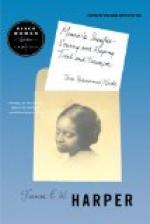He went back into the country, and told his wife that he had found a trader, who thought the child so beautiful, and that he had bought her to raise as a fancy girl, and had given him five hundred dollars for her. “And here,” said he, handing her a set of beautiful pearls, “is my peace offering.”
Georgette’s eyes glistened as she entertwined the pearls amid the wealth of her raven hair, and clasped them upon her beautifully rounded arms.
What mattered it to her if every jewel cost a heart throb, and if the whole set were bought with the price of blood? They suited her style of beauty, and she cared not what they cost. Proud, imperious, and selfish, she knew no law but her own will; no gratification but the enjoyment of her own desires.
Passing from the boudoir of his wife, he sought the room where Ellen sat, busily cutting and arranging the clothing for the field hands, and gazing furtively around he said, “here is Minnie’s likeness. I have managed all right.” “Thank Heaven!” said the sad hearted mother, as she paused to dry her tears, and then resumed her needle. “Anything is better—than Slavery.”
Chapter V
Before I proceed any further with my story, let me tell the reader something of the Le Granges, whom I have so unceremoniously introduced.
Le Grange, like Le Croix, was of French and Spanish descent, and his father had also been a Haytian refugee. But there the similitude ends; unlike Le Croix, he had grown up a gay and reckless young man, fond of sports, and living an aimless life.
His father had on his plantation a beautiful quadroon girl, named Ellen, whom he had bought in Richmond because she begged him to buy her when he had bought her mother, who had been recommended to him as a first-rate cook. They had been servants in what was called one of the first families of Virginia, and had been treated by their mistress with more kindness and consideration than generally fell to the lot of persons in their condition. As long as she lived, they had been well fed and well clothed, and except the deprivation of their freedom, had known but few of the hardships so incident to slave life; but a reverse had fallen upon them.
Their mistress had intended to set them free, but, dying suddenly, she had failed to carry out her intention. Her property fell into the hands of distant heirs, who sold it all, and divided it among themselves. Ellen and her mother were put up at auction, when a kindly looking old Frenchman bought the mother. Ellen stood trembling by; but, when she saw her mother’s new master, she started forth, and kneeling at his feet, she begged him to buy her. The mother joined in and said, “Do, Massa, and I’ll serve you faithful day and night; there is a heap of work in these old bones yet.”
Mr. Le Grange told her to be quiet, and he would buy her. And, true to his word, although the bidding ran high, and the competition was fierce, he bought her; and the next day, he started with them for his plantation on Red River.




